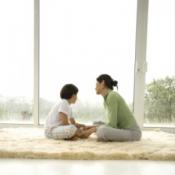 In a culture saturated with violent images, parents naturally worry about their children and the influence of these images on their behavior. The question of whether being exposed to violent images or interacting with violent computer or video games increases the level of violent or aggressive behavior in children is a subject of much research and debate.
In a culture saturated with violent images, parents naturally worry about their children and the influence of these images on their behavior. The question of whether being exposed to violent images or interacting with violent computer or video games increases the level of violent or aggressive behavior in children is a subject of much research and debate.
Regardless of how children are affected by depictions of violence in media, it is important to remember that even children who are not exposed to violence on television and do not play violent computer or video games are often still aggressive. In fact, all children have the potential to act aggressively; it is part of our human endowment. As parents, it is our job to monitor and intervene in our children’s aggressive activity so that they (and those around them) remain safe. This can be a confusing and difficult task. However, it is made much easier if we ask ourselves a few basic questions and follow some basic guidelines:
What Is the Difference Between Aggressive Play and Aggressive Behavior?
With aggressive play:
- No one intentionally hurts another physically or emotionally.
- The play between peers in mutual.
- The children playing understand the difference between fantasy and reality.
With aggressive behavior, one or more of the above guidelines is not followed by one or more of the children involved.
Why Do Children Engage in Aggressive Play?
- Children often feel powerless and frustrated by how little agency or control they have in their lives. Aggressive play gives children a sense of control and mastery over their environment.
- It gives children a way to express certain feelings and desires that they may not have access to or can’t yet put into words.
- It helps children work through their developing sense of right and wrong.
How Do I Handle Aggressive Play?
- Try to take a nonjudgmental attitude. Aggression is a normal part of the human condition and of your child’s emotional life.
- Make sure the situation is safe and mutual and that no one is hurt or scared.
- Keep an eye on the level of stimulation; if it gets too high and you worry it will get out of control, step in and stop/redirect the play.
- Take your own comfort into account; we each have a different tolerance level for aggression.
How Do I Handle Aggressive Behavior?
- Like with play, take a nonjudgmental attitude. We don’t want to shame our children with regard to their aggressive feelings (though we do have to intervene with their behavior).
- Point out to your child when play has become behavior. For example: “It looks like Tommy doesn’t want to play anymore,” or, “I am worried what you are doing is not safe.”
- Try to identify the stressor (if there is one) that is causing the behavior—too much stimulation, difficulty putting feelings into words, etc. If the child is old enough, point out the stressor to the child. Try to resolve stressors when possible (quiet time, giving words to feelings, etc.).
- Set limits! Your child may not be in control of their impulses and may need you to step in.
Some children who behave aggressively need more help feeling safe and in control. When you sense that your child’s aggressive behavior is interfering with the ability to function (at school, with peers or siblings, etc.) or is dangerous or out of control, it may be time to seek professional help from a child therapist or parenting expert. Your child might be struggling with a particularly difficult stressor or developmental challenge and need a bit more help getting back on track.

The preceding article was solely written by the author named above. Any views and opinions expressed are not necessarily shared by GoodTherapy.org. Questions or concerns about the preceding article can be directed to the author or posted as a comment below.

 7 Tips for Discussing Touchy Topics with Your Child
7 Tips for Discussing Touchy Topics with Your Child 5 Reasons Discipline Isn't Working with Your Child
5 Reasons Discipline Isn't Working with Your Child Hey, Parents, Here's a Radical Idea: Don't Yell at Your Kids
Hey, Parents, Here's a Radical Idea: Don't Yell at Your Kids

Please fill out all required fields to submit your message.
Invalid Email Address.
Please confirm that you are human.
Leave a Comment
By commenting you acknowledge acceptance of GoodTherapy.org's Terms and Conditions of Use.